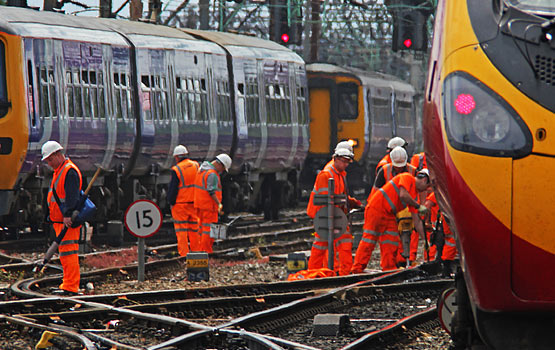|
Cost-cutting in any sector - be it health, police or social services - comes with obvious inherent dangers if frontliners are not immunised. Given its safety-critical nature, that truism must also encompass railway maintenance. Despite the lessons to be learned from Grayrigg where an overwhelmed supervisor forgot to complete a points inspection, Network Rail has since severed hundreds of experienced hands, resulting in the remaining workforce being stretched ever more tightly. An increasing reliance on unproven technology and the recruitment of much-vaunted apprentices - while laudable - does nothing the fill the void left behind.
Internet forums are awash with anecdotal evidence on the impact of economies. But such jibber-jabber is easy to write off as the rantings of folk with axes to grind, or the ill-informed. Rather more weight can however be attached to the Office of Rail Regulation’s 2013 Health & Safety Report which makes uneasy reading for the infrastructure’s custodian.

In relation to staff numbers, investigators found that “not all the planned maintenance work was delivered, partly because there were not enough people to do the work and partly because Network Rail does not always have the right information to plan its work effectively, including complete asset registers.” Beyond that, “Network Rail has insufficient resource to deliver all the maintenance work it planned in track and off-track assets, such as fencing and vegetation management, which can create the potential for an increase in asset failures and risk of train accidents.” This has manifested itself through a greater number of track geometry faults and rail breaks, particularly on the East Coast Main Line and routes in Sussex.
Worryingly, ORR inspectors found “examples of poor planning and poor systems of work, which meant that track workers are unnecessarily exposed to additional risks.” It will come as no surprise given Network Rail’s love of one-size-fits-all edicts that “a lack of competence in some people required to complete risk assessments” was evident. While the industry’s development of several trackworker safety initiatives over the years was acknowledged, some “have failed or not delivered the expected outputs.” That’s an unhelpfully vague statement but could they have Rimini in mind?
All of this has an undoubted impact on behaviour at the trackface. The ORR asserts that “actions at supervisory level and in the workforce do not always reflect the right safety culture. There is evidence of underlying tensions between safety and train punctuality and train performance.” It goes on, “there were still too many examples of poor practice, unsafe behaviours and a lack of impetus from supervisors or from within the workforce to challenge work not being done as planned. We found that improvements are required in basic housekeeping standards to reduce worksite slips, trips and falls.”
This latter raft of issues are driven by falling morale, a sense of being undervalued and time constraints brought by excessive workloads. Management reaps what it sows: if an ever-greater burden is imposed upon a diminishing workforce - and the consequences of that are wilfully ignored - culture will be the first thing to suffer. Why should we care if you don’t?
|
| Why should we care if you don’t? |
|
I’ve long being of the view that Network Rail finds itself between a rock and a hard place: the governmental insistence that it achieves more for less - much less - now defines everything it does. Of course value-for-money is important and it’s beyond question that the industry flushed cash down the toilet at a time of plenty, but let’s not compromise public and workforce safety by undermining vital operational activity when overpaid treacle stirrers still languish in office blocks. RSSB - particularly its research programme - could be sacrificed without anybody noticing. How did the Board escape the quango cull?
Quite whether the strain on frontliners connects with the deaths of two welders at around 05:30 on the morning of 19th June is not yet clear. 20-year-old Zac Payne and Michael Morris, 48, employed by Renown Railway Services, were the sole occupants of a van that collided with a stationary flat-bed lorry which was parked in a lay-by on the A1 south of Newark. The collision resulted in a devastating fire, thought to be as a result of the acetylene gas cylinders carried in their vehicle. The pair were returning home after taking part in overnight track renewals at Langley Junction, a job they agreed to take part in just a few hours earlier.
Inquiries will no doubt seek to establish what their work patterns had been over the preceding days and weeks. Did fatigue play a part? Beyond doubt though is the impact this tragedy will have had on Zac and Michael’s family and friends. It’s at times like these - when members of the railway’s own community are lost - that we need to stop and reflect on what’s really important.
Network Rail remains under considerable financial scrutiny and pressure. But this challenge will be trifling in comparison with the reputational damage that would be inflicted by another catastrophic failure of the infrastructure. We know from Hatfield what the consequences of a rail break can be on a high-speed line. Further cuts to staff numbers, at a time when some depots are already struggling to do what’s required of them, would be unsustainable; probably reckless. Network Rail can certainly get rid of those fulfilling peripheral roles of questionable value, but it must not bring jeopardy upon itself by meekly tugging its forelock and accelerating down a perilous track. There’s more at stake here than just finance.
In case you missed it, Radio 4's 'Face the Facts' programme recently broadcast a programme that examined the use of contractors and the culture within them. Well worth tuning in if you have half-an-hour to spare. No-one in RSSB has an excuse not to listen. Here's the link.
Story added 1st August 2013
|